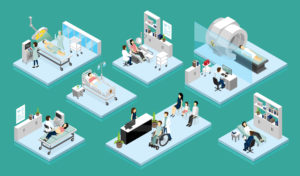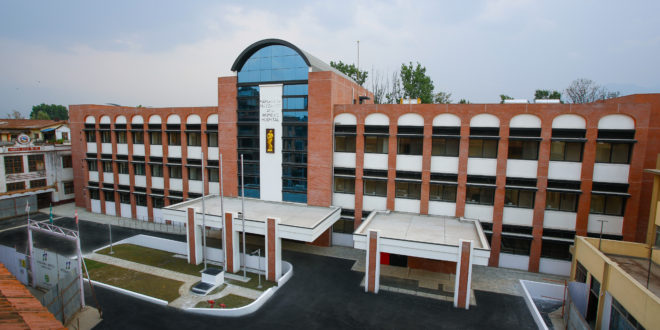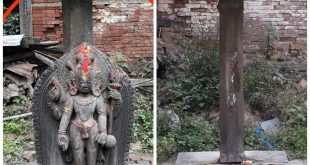 Background
Background
Paropakar Maternity and Women’s Hospital (PMWH) was established with the joint effort of Paropakar Sansthan and the erstwhile royal family in 2016 BS (1959 AD). Construction of hospital was started from 2010 and completed in 2016. This is the central maternity and women’s hospital serving people from all over the country. Now, this hospital has three areas of service—clinical (treatment) service, education, and clinical research. PMWH gives emphasis on good quality reproductive and neonatal health services at reasonable cost. Being a tertiary center for women and neonates, in addition to the general service, it gives service of different sub-specialty of reproductive health, such as urogynaecology , oncology, and sub-fertility.
The total number of OPD patients was 1,96,230 in fiscal year 2075/76, whereas it was 1,13,000 in 2071/72, i.e. 74% increase in 5 years’ duration. Total deliveries were 22,147 in 2075/76, whereas it was 18,618 in 2071/72 (19% increase). In the year gone by, 36,627 patients were admitted, 22,147 delivered babies, 8,387 underwent major operations, 2,521 had minor operations, 68 received cancer treatment, 80 had prolapse surgery, and 67,860 were provided ultrasound service. Additionally, 1,30,000 laboratory tests were performed during the year.
The key programs of the hospital are as follows: Aama Surakshya Program, pelvic organ prolapse surgery, social service unit, comprehensive abortion care, family planning service, OCMC, adolescent reproductive clinic, Bhaisepati Outreach Clinic, genital cancer screening, free newborn care, laparoscopy surgery, sub fertility clinic, extended (paying) hospital service, laboratory service, blood bank service, hospital pharmacy, and imaging services.
Reproductive health training program includes advanced skilled birth attendant (ASBA), skilled birth attendant (SBA), comprehensive abortion care (CAC), adolescent reproductive and sexual health (ASRH), anesthesia assistant (AA), newborn care training, family planning, including minilap and postpartum IUCD, postgraduate in obstetrics and gynecology (MD), proficiency certificate level nursing, fellowship in urogynaecology and oncology, posting of DM/MCH of different subjects, and posting of nursing and paramedic courses.
We have given priority for different national and international activities. We provide accommodation and airfare for researchers conducting study in PMWH, and willing to present their research findings in SAARC countries. Three double blind randomized multi-country trials were done during last the four years. Our institutional review committee (IRC) facilitates, monitors, and evaluates the studies. More than 100 studies were approved by IRC.
Hospital Waste Management: Medical and surgical treatment of patients produce hazardous and non-hazardous waste products. Our waste management center collects material from different wards and units. Hazardous waste is made germ-free by autoclaving. Our unit is using two autoclaves. Waste products are autoclaved and then stored for disposal. Non-hazardous waste is stored in different chambers and sold every fortnightly. Annual income from waste is about 6, 00,000 rupees.
Biogas Plant: The hospital has its own biogas plant. Placenta and leftover food are decomposed, and biogas is produced to cook food items in the hospital kitchen. Biogas plant is useful to reduce waste hazard and maintain cleanliness of the hospital.
Minimally Invasive Gynecology Surgery: Minimally invasive surgery (MIS),or laparoscopy, in gynecology is a very useful method of surgery. Short hospital stay, better diagnostic accuracy, less pain, good cosmetic appearance, short postoperative recovery, and less need of blood transfusion, along with minimal chance of wound infection are advantages of laparoscopy. PMWH had started MIS three years ago and regular MIS is performed now.
Electronic Hospital Record (EHR): Admission, treatment, and discharge are recorded by EHR in PMWH. Access to EHR has been given to the Ministry of Health and Population (MOHP). For evaluation and monitoring, PMWH has requested MOHP to strengthen the digital record of all patients admitted in government health institutions.
Extended Hospital Service (EHS): Maternity hospital-based paying clinic (EHS) was started from Bhadra 2072 after decision of the hospital development committee and approval of MOHP. While paying OPD service is available after 3:00 pm, paying surgery is performed after 3:00 pm, and before 9:00 am. This service does not interfere with the regular health services. It is easier to retain consultant doctor in PMWH. Patients get faster health services through EHS and subsequently, reduces the waiting period in regular services.
Bhaisepati Outreach Clinic (BOC): PMWH started BOC in a building in Bhaisepati donated by a Dixit family from Jestha 2075. This outreach clinic is providing obstetric gynecology and pediatric OPD services, along with ultrasonography and laboratory services. Local people from and around Bhaisepati area have excess to these services at affordable costs in their doorstep.
Paropakar Nursing Campus: This campus was established three years ago to produce skilled staff nurses to provide standard nursing service. This could be the role model campus for nursing professionals. This is located in Kupondole with good physical facility. Every year, 40 students are enrolled under National Academic of Medical Science (NAMS), recognized by Nepal Nursing Council . We are planning to start PCL midwifery, Bachelor of Nursing Science, and Bachelor of Midwifery from next academic year.Hospital Pharmacy: Paropakar Hospital pharmacy sells medicines and surgical items 24 hours a day at reasonable cost. Hospital follows purchase policy of Government of Nepal. Medicines of good quality (WHO GMP certified) are available at one third to half of the MRP. This service reduces the expenditure of medical and surgical products. Kuruwa Ghar: Male visitors are not allowed to stay indoors in PMWH. A “Kuruwa Ghar” with capacity for 70 people is being operated since the last three month.
Oxygen Plant: Oxygen gas is a vital adjunct for the patients, and continuous and regular supply of medical oxygen is essential in hospitals. Interrupted supply of oxygen creates many problems. Now, PMWH has installed an oxygen plant to prevent irregular supply.
Fellowship program: In addition to nursing and MD programs, PMWH has started a one-year fellowship in urogynaecology and oncology.
Diagnostic Services: Laboratory services has been upgraded and strengthened, and new tests added to diagnose and manage patients. Mammography, CT scan, USG, anomaly scan, trans vaginal USG, and digital x-ray are available in PMWH.
Genital Cancer Screening: Conventional PAP smear, liquid-based cytology (LBC), VIA, VILI, colposcopy, human papilloma virus testing, transvaginal scan, tumor marker, cancer Imprint cytology, and histopathology services are performed regularly in PMWH.
Building Construction: The main new building was built through JICA by the Japanese government, with 188-bed facility, MICU, NICU, OT, postoperative ward, labor room, birthing center, antenatal ward, emergency ward, blood bank, emergency lab, auditorium, class room, library, and faculty rooms. Kuruwa Ghar and nursing college building with IVF center have also been built and are in use.
Blood Bank: In addition to regular grouping, cross matching, and serology testing, the blood bank has been working for component separation competently on a regular basis.
Challenges of Management
Managing a hospital is one of the difficult task for hospital managers. Challenges are mainly related to financial resources, human resources, scientific management of patients and expectation of patients and their relatives. As we all know, only less then 5% of national budget is allocated for health services. Hospital gets less amount of budget from the government, which is grossly inadequate for hospital functioning. Acquiring new technology and methods, upgradation of physical facility and installation of new equipments need extra budget.
Well trained, motivated human resource provides optimum service in a hospital. Frequent transfer, delay in appointment and age limit in entering into health service have negative impact. Scientific knowledge, skill, behavior and attitude can improve the treatment modalities of diseases. There is a huge gap between patients expectations and health service delivery. This gap has created tremendous pressure on health managers.
The annual total number of delivery PMWH is 22,147. Women from Kathmandu Valley and out side get treatment at low cost or free of cost here. This hospital is a teaching and training site for all reproductive health programs. Safe abortion service, advanced skilled birth attendants (ASBA), skilled birth attendants (SBA), adolescent sexual and reproductive health (ASRH), neonatal care training, anesthesia assistant training, laparoscopy training, family planning training, clinical posting of nurses, paramedics and MD residents have got key role to reduce maternal and neonatal morbidity and mortality in all over the country. Experts have taken responsibilities to prepare national guidelines for reproductive health. These all activities help reduce maternal mortality in the country.
The biggest challenges for a pregnant woman to attain a successful delivery are present within family, society, health institutions and country itself. Inadequate family and social support delays the health seeking behavior of women. Delay in transportation is mainly due to geography and poor transportation facility. Even health institutions are not well equipped with skilled human resources in many parts of the country that gives rise to delay in treatment.
The event- Successful Delivery is the practical summary of the role of woman, her husband, family members, society, health institution and nation. Birth of a child is not private matter of a couple or family, this is the social event as existence and health of a citizen contributes a lot for the health and progress of the nation in broader aspect.
 Medicosnext
Medicosnext




